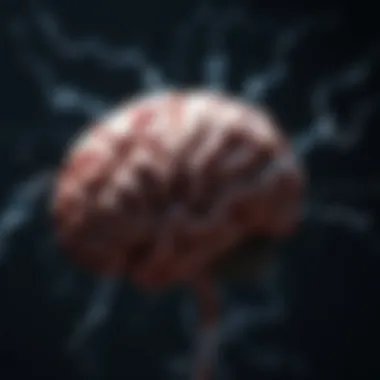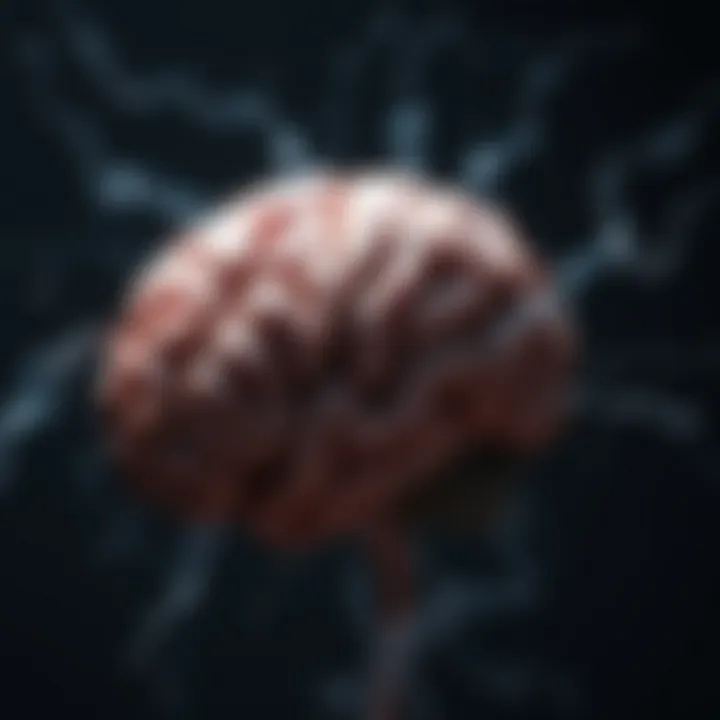Understanding Symptoms Caused by Stress


Intro
Stress is more than just a buzzword thrown around in daily conversations; it is a complex response that can take a toll on both body and mind. In today’s fast-paced world, the symptoms of stress can often blend into the background noise of our lives, making it difficult to recognize when we are being affected. This article aims to peel back the layers and provide a comprehensive understanding of the numerous symptoms associated with stress. By delving into the psychological and physical aspects of the condition, this discussion seeks to illuminate how stress can warp our daily interactions and overall quality of life.
Understanding Mental Health and Well-being
What is Mental Health?
Mental health refers to our cognitive, emotional, and social well-being. It involves how we think, feel, and behave in our daily lives. Mental health influences how we handle stress, engage with others, and make choices. An understanding of mental health is crucial in recognizing the signs of stress, as it serves as the foundation of our overall well-being.
The Importance of Prioritizing Mental Well-being
In the bustle of modern life, mental health is frequently placed on the back burner, overshadowed by physical health concerns. However, putting mental well-being at the forefront is essential. Like a car engine that requires oil for efficiency, our minds need care and attention to function optimally. Chronic stress, if unchecked, can lead to severe issues such as anxiety disorders or depression. Thus, acknowledging the need for mental well-being is the first step in a healthier, more balanced life.
Common Mental Health Challenges and Disorders
Many individuals grapple with various mental health challenges that stem from stress. Some of the most common include:
- Anxiety disorders: Persistent feelings of worry or fear that can disrupt daily activities.
- Depression: A debilitating mood disorder characterized by feelings of sadness and loss of interest.
- Post-Traumatic Stress Disorder (PTSD): A mental health condition triggered by experiencing or witnessing a traumatic event.
Recognizing these challenges often helps in identifying the symptoms related to stress. The earlier one acknowledges these symptoms, the sooner they can seek help.
Strategies for Improving Mental Health
Self-care Techniques and Practices
Self-care is a broad umbrella that covers many practices aimed at improving well-being. Activities like journaling, indulging in hobbies, or simply taking a long walk can make a difference. The notion of self-care isn’t selfish; it's a fundamental practice that helps replenish mental reserves.
Building Resilience and Stress Management
Resilience is the ability to bounce back from challenges. It is akin to a rubber band; the more you stretch it without breaking, the stronger it becomes. Consider implementing mechanisms for stress management, such as deep-breathing exercises or engaging in physical activities. These methods can fortify your ability to cope with stressors.
Seeking Professional Help: Therapy and Counseling
In some situations, connecting with a professional like a therapist or counselor can prove invaluable. Therapy can serve as a safe space to explore thoughts and feelings. Additionally, trained professionals can equip individuals with tools to manage stress effectively with techniques tailored to their unique situations.
Finding Balance in Life
Healthy Lifestyle Choices: Diet, Exercise, and Sleep
Finding balance goes beyond mental exercises; it includes physical care too. A well-rounded diet, regular exercise, and sufficient sleep all play pivotal roles in stress management. Make small adjustments like including more vegetables or committing to a consistent sleep schedule. These changes can foster a more robust mental state all around.
Mindfulness and Meditation Practices
Practicing mindfulness fosters a present-focused mindset, alleviating stress by allowing an individual to recognize and accept their thoughts without judgment. Techniques such as meditation and breathing exercises can ground your thoughts and emotions, encouraging a sense of calmness and clarity.
Setting Boundaries and Managing Time Effectively
Time management is often a source of stress in our lives. Setting firm boundaries can alleviate the feeling of being overwhelmed. Learning to say “no” when necessary or crafting a schedule that prioritizes important tasks can lead to manageable workloads and better mental health.
Enhancing Personal Development
Goal Setting and Productivity Tips
Setting realistic and achievable goals is a productive way to channel energy. Personal development fosters confidence and helps to create a clearer path forward. Break tasks into bite-sized pieces to avoid feeling bogged down by overwhelming expectations.
Building Healthy Relationships and Social Connections
Surrounding ourselves with supportive individuals rarely goes unnoticed. Healthy relationships can serve as a buffer against stress. Invest time in those who elevate your mood, and don't hesitate to lean on them during tough times.
Practicing Gratitude and Positivity
Cultivating an attitude of gratitude helps shift focus from negative aspects of life to the positives. Simple practices, such as maintaining a gratitude journal, can instill a mindful appreciation for what you have, reducing overall stress.
Tips for Maintaining Mental Well-being
Strategies for Preventing Burnout
Burnout is like running on empty; it leaves one exhausted and unmotivated. To combat burnout, recognize early signs, such as irritability or fatigue. It’s crucial to take regular breaks and ensure that your workload is manageable.
Coping with Challenges and Setbacks
Life presents challenges that can induce stress, but facing setbacks with resilience is paramount. Embrace setbacks as learning opportunities and gather insights from these experiences.
Creating a Supportive Environment


Finally, the environment we surround ourselves with can significantly impact our mental health. Design spaces that make you feel comfortable and safe. Simple adjustments, such as decluttering or introducing plants, can uplift the ambiance, nurturing a more gentle mental state.
A holistic approach to understanding and managing stress goes beyond quick fixes. It requires commitment, self-awareness, and a willingness to learn and adapt.
In wrapping up this exploration, it becomes evident that knowledge is power. By understanding the symptoms associated with stress and taking concrete steps to address mental well-being, individuals are better prepared to lead fulfilling lives.
For more information on mental health and wellness, consider exploring resources provided by institutions like the National Institute of Mental Health or articles published on Mayo Clinic.
Recognizing Stress: An Overview
Understanding stress is crucial in today's fast-paced world. Stress affects every facet of life, making it essential to identify it before it spirals into more serious issues. In this section, we will cover what stress is, how it manifests, and why recognizing its signs is fundamental for mental health and well-being. The benefits of addressing stress early on are manifold; not only can it lead to improved physical health, but it can also foster stronger relationships and better productivity.
Defining Stress
Stress, in simplest terms, is the body's reaction to any change or demand. Not all stress is bad; in fact, a certain level of stress can motivate individuals to meet their goals. However, chronic stress, which persists over time, can wreak havoc on both physical and mental health. It is marked by feelings of anxiety, irritability, and a sense of helplessness. This definition is not merely academic; it serves as a foundational understanding for recognizing when stress has shifted from a manageable challenge to an impediment that needs attention.
The Stress Response System
When individuals encounter stressors, whether real or perceived, their bodies initiate a physiological response known as the stress response system. This system is a finely-tuned mechanism that prepares the body to deal with threats. Two major players in this response are the sympathetic nervous system and the hypothalamic-pituitary-adrenal axis. Together, they release hormones like adrenaline and cortisol, which heighten alertness, increase heart rate, and boost energy.
However, while this response is essential in acute situations, prolonged activation can result in a range of health issues, including cardiovascular problems and weakened immunity. The idea is to bring awareness to this cycle, helping individuals understand how their body responds to stressors and why recognizing symptoms is vital.
"Recognizing stress symptoms allows individuals to intervene early, fostering a proactive approach to mental and emotional health."
By dissecting these components of stress, we empower ourselves to recognize its signs and take meaningful action. Next, we will delve into the behavioral symptoms of stress, shedding light on how stress influences daily life decisions and habits.
Behavioral Symptoms of Stress
Recognizing the behavioral symptoms of stress is crucial for understanding how deeply it can affect us in various aspects of our lives. Unlike emotional or cognitive indicators, behavioral symptoms often manifest in observable actions, providing insight into an individual's mental state. When stress creeps into daily routines, it can disrupt normal behavior and lead to changes that might go unnoticed until they snowball into larger problems. Identifying these behaviors is not just a necessity for personal awareness; it allows for timely intervention and effective stress management strategies.
Changes in Appetite
When stress takes hold, the way we approach food can shift dramatically. For some, stress induces a loss of appetite, rendering meals unappealing, while for others, it can lead to binge eating or craving comfort foods like chips, chocolate, or pizza. This alteration stems from our body's stress response, which can trigger hormones that affect hunger.
- Loss of Appetite: Prolonged stress can lead to feelings of nausea or disinterest in food. Not eating regularly can have negative implications on physical health, such as low energy levels or weakened immune responses.
- Binge Eating: On the flip side, many individuals turn to food as a method of coping. Large quantities of food can provide a temporary sense of relief, but ultimately lead to guilt or further stress.
Understanding these changes is vital because both patterns can result in significant weight fluctuations. Monitoring one's eating habits during stressful periods can serve as a crucial indicator of overall mental well-being.
Sleep Disturbances
The impact of stress on sleep can’t be overstated. Many people experience difficulties falling asleep or staying asleep due to racing thoughts or physical tension. Insufficient sleep creates a cycle, increasing stress levels and impairing cognitive functions.
- Difficulty Falling Asleep: Stressful situations can lead to heightened alertness which, while useful in danger, hampers the ability to relax and fall asleep.
- Frequent Awakening: A common complaint among stressed individuals is waking up multiple times throughout the night. This fragmentation can leave one feeling more exhausted than before.
- Vivid Dreams or Nightmares: For some, stress might surface through restless dreams. These dreams can be distressing and compound feelings of fatigue and anxiety, perpetuating the cycle of sleeplessness.
Sleep disturbances warrant attention, as they are not merely an inconvenience. Chronic sleeplessness can escalate stress and lead to depression, making it essential to address any sleep issues as part of a comprehensive stress management plan.
Increased Substance Use
It's not uncommon for individuals facing intense stress to turn to substances as a coping method. Whether it’s alcohol, tobacco, or even prescription medications, the allure of immediate relief can be too strong to resist. The challenge is that what initially feels like a remedy may morph into a crutch.
- Alcohol and Tobacco Usage: Many might find themselves reaching for a drink more frequently or lighting up cigarettes as a way to cope with everyday pressures. While these substances might provide temporary relief, they often exacerbate stress and can lead to dependency.
- Prescription Medication Misuse: Stress may also result in the misuse of medications, whether legally prescribed or otherwise obtained. This behavior poses risks, including addiction and a host of negative health consequences.
It’s necessary to recognize this pattern. Increasing reliance on substances can act as a signal that professional help may be needed. Taking personal stock of substance use can illuminate stress levels and facilitate necessary changes.
"Understanding the connection between behavior and stress is the first step toward regaining control and improving overall well-being."
Emotional Symptoms of Stress
Understanding the emotional symptoms of stress is critical, as they often serve as early warning signs indicating how stressors are impacting individuals on a psychological level. When stress mounts, it doesn’t just stay bottled up; it seeps through into our emotions. This section aims to shed light on how anxiety, irritability, and feelings of being overwhelmed present significant hurdles, influencing not only personal well-being but also interactions with others and performance at work. Recognizing these emotional responses can lead to better coping strategies, ultimately enhancing one’s quality of life and mental well-being.
Anxiety and Tension
Anxiety is like that unwanted houseguest who overstays their welcome. It develops when individuals feel a sense of dread about future events, often leading to an excess of worry and tension that manifests both mentally and physically. It’s not unusual for someone under stress to frequently catch themselves feeling antsy or on edge, sometimes even reaching for a fidget spinner or pacing about.
This anxiety can cause an increase in heart rate and a feeling of tightness in the chest, making it difficult to focus on daily tasks. People may find themselves overthinking small decisions or worrying excessively about things outside their control. Acknowledging this symptom is paramount. It lays the groundwork for addressing the underlying causes and seeking managed solutions through techniques such as cognitive behavioral therapy or engaging in relaxation practices.
"Stress is not what happens to us. It is our response to what happens. And response is something we can choose." – Maureen Killoran
Irritability and Mood Swings
Have you ever felt like you’re on an emotional rollercoaster, with mood swings coming at you faster than a speeding bullet? Irritability can be described as the straw that breaks the camel's back. Under stress, small annoyances that usually wouldn't bother someone suddenly feel magnified.
This heightened irritability can lead to conflicts with family, friends, and coworkers. A simple comment, or even forgetting to do the dishes, can lead to explosive reactions. Recognizing those patterns is essential. Keeping a mood journal can help track triggers and recognize when stress turns into irritability. It’s about gaining awareness and tempering responses, allowing for more constructive dialogue and emotional balance.
Feelings of Overwhelm
Feelings of overwhelm might hit like a tidal wave, making tasks that were once easy seem Herculean. Stress can pile up like laundry — before you know it, what seemed manageable now feels like an insurmountable mountain. Individuals experiencing overwhelm may struggle to focus or make decisions, feeling like they’re stuck in quicksand. This can lead to procrastination and avoidance behaviors, which only adds to the stress cycle.


To combat feelings of being overwhelmed, it’s helpful to break down tasks into smaller, manageable steps, or even prioritize what needs to be tackled. Seeking support from friends or utilizing professional resources, such as counseling, can provide necessary perspective and tools to regain control.
As we delve into these emotional symptoms, the interconnectedness of our physiological responses and mental health becomes increasingly apparent. Understanding the emotional facets of stress emphasizes the need for an integrated approach to mental wellness— one that combines awareness, proactive strategies, and supportive relationships.
Cognitive Symptoms of Stress
Cognitive symptoms play a crucial role in understanding how stress manifests in our daily lives. When the brain is under pressure, the way we think, remember, and make decisions can become severely affected. This section aims to shed light on these cognitive symptoms, illustrating how they impact our ability to function effectively. Grasping these symptoms can be instrumental for individuals prioritizing their mental health, offering insight into behaviors that may signal underlying stress.
Difficulty Concentrating
One of the most common cognitive symptoms of stress is difficulty concentrating. When stress levels rise, the brain operates in a heightened state of alertness, making it harder to focus on tasks at hand. Instead of a smooth flow of thoughts, you might find yourself easily distracted, jumping from one idea to another without completing any task. This scatterbrained feeling not only hinders productivity but can also deepen feelings of frustration and inadequacy.
- Impact on Work: Individuals may struggle to keep track of assignments or miss important details during meetings.
- Social Interactions: When trying to engage in conversation, you might notice your mind wandering, making it hard to follow what others are saying.
Learning to recognize when concentration slips can be the first step toward addressing stress. Taking breaks, practicing mindfulness, and even setting small, achievable goals can help reclaim focus.
Memory Problems
Stress can significantly affect your memory, leading to seeming lapses in recollection. When under stress, the brain can become overloaded, resulting in what many call a "mental fog." You might forget appointments, misplace items, or struggle to recall names or faces even with familiar individuals. This symptom can feel particularly alarming, as memory is a core component of daily functioning.
- Types of Memory Impacts: Short-term memory can falter more than long-term memory. Everyday tasks may become difficult as you forget to complete steps in your routines.
- Emotional Weight: The frustration that comes from forgotten tasks may also amplify feelings of anxiety, creating a vicious cycle.
Implementing memory aids, like to-do lists or reminders, can be a practical approach to combat these effects. That short burst of stress might seem manageable, but it’s essential to address underlying issues to avoid long-term cognitive decline.
Indecisiveness
When stress creeps in, making decisions can become an overwhelming task. Indecisiveness is often a direct symptom of cognitive strain. Suddenly, choosing what to eat or how to approach a work project can feel monumental. This paralysis can reflect an inability to process information efficiently, leading to a fear of making the wrong choice.
"Indecisiveness often stems from a build-up of choices, where stress clouds judgment and complicates even the simplest of tasks."
- Examples of Effects: In a high-pressure work environment, hesitant choices can lead to missed opportunities or significant delays.
- Social Consequences: In personal life, relationships may suffer as second-guessing creates tension in decisions that involve others.
Cultivating a practice of decision-making, whether through pros and cons lists or seeking input from trusted friends, can help mitigate the impact of stress-induced indecisiveness. Embracing small choices can also build confidence to tackle larger decisions when stress is prevalent.
By understanding these cognitive symptoms of stress and recognizing their manifestations, individuals can better navigate their mental landscape. This awareness is beneficial not only for personal growth but also in cultivating a more supportive environment in social and occupational settings. For those seeking deeper insights, resources like Wikipedia or Britannica can provide broader context on stress-related cognitive issues.
Physical Symptoms of Stress
Understanding the physical symptoms of stress is crucial for recognizing how deeply stress can affect one's overall health. While many individuals are quick to identify emotional or behavioral changes when feeling stressed, the body also responds in strikingly significant ways. These symptoms can manifest as noticeable discomfort or illness, often signaling that it is high time to address the underlying stressors.
Being aware of these physical ramifications of stress is not just about self-diagnosis but can serve as a roadmap for seeking appropriate intervention early. When we examine these symptoms, it’s like shining a light on the hidden signals our body sends us, allowing us to take proactive steps towards better health.
Muscle Tension and Pain
Stress often manifests itself in brute physicality through muscle tension. Whether it's the tightness in your shoulders as you sit hunched over a computer, the clenching of jaws during tough conversations, or even the stiffness in your back after a long day, muscle tension remains a hallmark of stress.
This tension influences circulation and mobility, leading to chronic pain conditions if left untreated. Some individuals report that their muscles feel like rubber bands, stretched too tightly, just waiting to snap. It’s important to recognize these signs and consider ways to promote relaxation, such as yoga or simple stretches throughout the day.
Gastrointestinal Issues
A significant number of people experience gastrointestinal disturbances when under stress. Symptoms may include nausea, cramping, and even more severe conditions like irritable bowel syndrome. Our gut often reacts instinctively to stress, driven by the gut-brain connection.
It's fascinating how what affects the mind can significantly alter our digestive processes. Managing stress through a balanced diet and mindfulness can be instrumental in easing these symptoms. The well-worn phrase, "you are what you eat," rings particularly true here: a diet rich in fresh fruits and vegetables, and low in processed foods, can help support gut health amidst stress.
Cardiovascular Effects
Under stress, the body's fight or flight response engages the heart. Hormones like adrenaline ramp up heart rate, directly impacting blood pressure. Over time, chronic stress takes a heavy toll on the cardiovascular system, leading to more serious conditions like hypertension or even heart disease.
It may be worth noting, too, that many individuals dismiss occasional heart palpitations or increased heart rates as insignificant. However, these should be regarded as an essential call to action, indicating a need for managing stress. Incorporating regular physical activity into one's routine can mitigate these cardiovascular risks, promoting both heart health and a holistic sense of well-being.
Weakened Immune Function
Stress can also play a significant role in reducing the effectiveness of the immune system. Heightened stress levels can lead to inflammation, making individuals more susceptible to infections and illnesses. Periods of intense stress might even trigger infections that one might not have been prone to otherwise.
Practicing stress management methods, such as meditation or balanced sleep schedules, can act as a buffer against the immune system's decline, making a world of difference. It’s vital to recognize that taking a few moments for oneself is not just good for the mind—it is as crucial for the body.
Managing stress effectively can boost your immune response and overall health. Ignoring the symptoms could escalate the issue, costing you both health and vitality.
Optimizing mental well-being leads to enhanced physical health, illustrating the intertwined nature of emotional and bodily health. This makes it all the more essential to remain informed about how stress manifests physically, enabling proactive and preventive measures in daily life. Such awareness can empower individuals to embrace tools and techniques to foster lasting resilience.
Chronic Stress: Long-Term Effects
Chronic stress is more than just a passing phase; it's like a slow-burning fuse that impacts the very fabric of our mental and physical health. This section explores how ongoing stress can shape our psychological state, relationships, and work life, laying bare the often-overlooked repercussions of emotions we might brush off as fleeting anxiety. Understanding these effects encourages us to dive deeper into our coping mechanisms and highlights the importance of proactive health strategies.
Psychological Disorders
Depression


Depression stands tall among the grave outcomes of chronic stress. It’s not just about feeling sad; it envelops individuals in a heavy cloak of hopelessness and fatigue that can color every instance of daily life. A common characteristic of depression is its ability to distort thinking patterns, leading one to spiral into negative self-talk. This deeply ingrained mindset can contribute significantly to the overall topic of stress, serving as an indicator of how unresolved emotional turmoil can escalate into serious mental health concerns.
What makes this choice pertinent for this discussion is its prevalence. Many may dismiss feelings as “just the blues,” but recognizing depression as a potential outcome can be eye-opening. The unique feature of depression is its interplay with other symptoms of stress, such as fatigue and cognitive impairment, highlighting how intertwined mental health can be with daily function. Moreover, addressing depression in this article enables readers to see the potential long-term consequences of ignoring stress—advocating for awareness and action can lead others on a path to recovery.
Post-Traumatic Stress Disorder
Post-Traumatic Stress Disorder (PTSD) can often be a heavy hitter when we talk about chronic stress. This disorder shines a light on how specific traumatic experiences can linger and morph into a persistent state of stress. A defining mark of PTSD is the haunting recollection of past traumatic events, which can occur unexpectedly, pulling individuals back into their painful memories.
The importance of discussing PTSD in relation to stress symptoms is paramount. It informs readers that stress can often lead to severe psychological responses that require even more attention to manage effectively. The unique feature here is the fact that while PTSD can arise from trauma, it can also be exacerbated by daily stressors that often go unchecked. Stress management becomes a crucial strategy to prevent more complex psychological responses, providing an advantageous context to de-stigmatize seeking help.
Burnout
Burnout emerges as a significant aspect of chronic stress, particularly in teaching professions and corporate roles. It represents the endpoint for many who enable themselves to be perpetually 'on,' draining every last drop of emotional energy. A key characteristic of burnout is emotional exhaustion; individuals often feel depleted and check out mentally, as if they've run out of gas on the highway of life.
Including burnout in this article is particularly beneficial, as it reflects the modern societal pressures that push people to their limits. Its unique feature is the subtle way it develops over time, unlike acute stress reactions that hit like a freight train. Understanding burnout permits insight into managing energy levels and recognizing the necessity for balance in life. This knowledge could equip individuals to navigate work and home life with more resilience through practical strategies and support systems.
Impact on Relationships
Chronic stress doesn't just affect the individual—it ripples into every corner of life, particularly in personal relationships. When someone grapples with ongoing stress, they may withdraw or lash out, causing friction and misunderstandings between loved ones. Additionally, chronic stress can lead to communication breakdowns. This deep impact on interpersonal relationships underscores the importance of monitoring stress levels and promoting open dialogue. Understanding how stress seeps into relationships can encourage individuals to cultivate empathy and consider the well-being of others within their social circle.
Occupational Consequences
In the workplace, chronic stress can manifest as decreased productivity and job satisfaction. Employees under constant pressure may struggle to complete tasks, leading to a drop in performance. It could spiral into a sense of inadequacy and prompt them to question their career choices. Recognizing the occupational consequences of chronic stress emphasizes the need for workplace wellness programs and encourages organizations to foster a supportive environment. By addressing stress's undercurrent, companies can not only retain talent but also uplift the overall morale of their workforce.
The effects of chronic stress are profound and wide-ranging, influencing every aspect of life. Awareness and proactive management are crucial in averting its long-term consequences.
Stress Management Techniques
Effective stress management is essential to mitigating the impact of stress on overall well-being. This section emphasizes a variety of techniques aimed at reducing stress, promoting mental clarity, and enhancing resilience against stressful stimuli. Each technique has its own set of benefits and considerations, and incorporating them into daily life can lead to long-lasting improvements in both emotional and physical health.
Mindfulness Practices
Mindfulness is the practice of staying present and fully engaging with the moment, without judgment. This approach nurtures self-awareness and helps individuals understand their thoughts and feelings. The beauty of mindfulness lies in its simplicity; it can be practiced anywhere and at any time.
Key mindfulness techniques include:
- Meditation: Spend a few minutes each day focusing on your breath, observing thoughts as they arise, and letting them pass without attachment.
- Body Scan: Lay down quietly, focusing on each part of your body systematically, helping connect mind and body.
- Mindful Eating: Instead of rushing through meals, savor each bite, appreciating flavors and textures. It enhances your relationship with food and reduces emotional eating.
Engaging regularly in mindfulness can lead to improved emotional regulation, a deeper sense of calm, and better coping strategies when faced with stressors.
Physical Activity
Physical activity plays a significant role in stress management. It doesn't have to mean hitting the gym daily; it can be as simple as taking a brisk walk or practicing yoga. When you engage in physical activity, your body releases endorphins, the "feel-good" hormones. This shift enhances mood and can significantly reduce stress.
Consider incorporating these activities into your routine:
- Walking or Jogging: Outdoor exercises not only boost your heart rate but also expose you to sunlight, further elevating your mood.
- Yoga: Combines physical postures with breath control, promoting relaxation and improving flexibility.
- Team Sports: Offers both a physical challenge and a social aspect, which can lift your spirits while fostering connections with others.
Regular engagement in physical activity can lead to better sleep, enhanced mood, and a stronger immune system, making it a powerhouse technique for managing stress.
Therapeutic Approaches
Therapeutic approaches can provide tailored support for those dealing with high stress levels. The professional guidance can play a pivotal role in managing stress through various modalities.
Some effective therapeutic methods include:
- Cognitive Behavioral Therapy (CBT): Helps individuals identify and change unhelpful patterns of thinking, making stress management more effective.
- Art Therapy: Allows individuals to express their emotions creatively, serving as an outlet for stress relief.
- Massage Therapy: Uses techniques to alleviate tension in the muscles while promoting relaxation.
These therapeutic avenues encourage healthier coping mechanisms, allowing individuals to address the underlying causes of their stress, rather than just tackling the symptoms.
Engaging in a combination of these stress management techniques can create a well-rounded strategy, enhancing overall resilience and well-being.
Closure and Call for Awareness
At the end of the day, understanding the symptoms caused by stress is not just an academic exercise. It’s a crucial aspect of taking charge of one’s mental health. As we've discussed throughout this article, stress, when left unchecked, can lead to a variety of psychological and physical consequences that could spiral out of control. Recognizing these symptoms early on is fundamental in preventing them from becoming overwhelming.
The Importance of Recognizing Symptoms
Being attuned to the signs of stress can make a world of difference. Early recognition allows individuals to take necessary action before symptoms morph into something more severe.
- Awareness serves as the first line of defense: When you notice changes in your behavior, emotions, or physical condition, it might indicate underlying stress.
- Connecting the Dots: Understanding that your irritability or muscle tension may not merely be a bad day can prompt you to seek support sooner.
- Empowerment: When you are equipped with knowledge, you can better advocate for your mental and physical health needs.
For instance, if feelings of anxiety creep in, knowing that it might be linked to stress could lead you to explore coping strategies before reaching a breaking point.
Encouraging Proactive Health Strategies
Awareness isn’t just about recognizing the symptoms; it’s also about taking proactive measures. Embracing a strategy for managing stress can significantly improve one’s quality of life.
- Mindfulness and Meditation: Train your mind to stay present. Practicing mindfulness can help calm racing thoughts and bring focus back to the here and now.
- Regular Physical Activity: Movement isn’t just good for the body; it releases endorphins, which can naturally lift mood and alleviate stress. Whether it’s a brisk walk or yoga, we’re not just talking exercise; it’s a lifestyle adjustment.
- Seek Help: Never underestimate the power of talking it out. Professional support, such as therapy, can provide insights that self-help methods may not offer.
"The greatest weapon against stress is our ability to choose one thought over another." – William James
To sum it up, stress is not merely an inconvenience; it’s a serious condition that affects numerous aspects of our lives. Recognizing its symptoms and implementing proactive health strategies are essential steps in managing stress effectively. This article aims to shed light on these issues not just to inform, but to inspire a proactive approach to mental health awareness, paving the way for healthier, more balanced lives.















